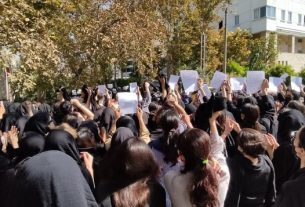The Islamabad High Court (IHC) suspended PTI Chairperson Imran Khan’s sentence in the Toshakhana case on Tuesday and ordered his release.
A division bench of the IHC, comprising Chief Justice Aamer Farooq and Tariq Mehmood Jahangir announced the much-anticipated reserved decision.
The court said that the copy of the judgement will be available shortly.
A day earlier, the counsel for the Election Commission of Pakistan (ECP), the defendant in this case, concluded his arguments.
A heavy contingent of police and paramilitary Frontier Constabulary is present inside and outside IHC premises. Separately, Imran’s sisters Aleema and Uzma Khan also reached the court.
Meanwhile, a petition has been submitted on behalf of the PTI chief by his lawyer Suleman Safdar, praying to the court to restrain the Federal Investigation Agency, National Accountability Bureau and the police from arresting him in any other case.
Imran’s legal team has requested the court to hear this plea today.
Earlier hearing
When the IHC bench resumed hearing the case on Monday, ECP’s counsel Amjad Pervaiz presented detailed arguments responding to the points raised by Imran’s lead counsel Latif Khosa.
At the first hearing of the case on August 25, Khosa had argued that Imran’s sentence should be suspended in view of an unauthorized filing of a complaint by the ECP; lack of jurisdiction; the fact that Imran was sentenced to only three years in prison; that the trial court deprived him of the right of defence and that it delivered the order without hearing arguments about the complaint’s maintainability.
While presenting arguments as to why it was necessary for the court also to issue notices to the state of Pakistan as a respondent in the case, Pervaiz contended that there was nothing wrong with the way the ECP filed a complaint against Imran at a district and sessions court.
The chief justice, however, noted that the ECP ordered its office to file a complaint and not the ECP secretary who can be authorized as per law to file such criminal complaints in courts. “Could anyone else besides the secretary file a complaint? Could the ECP ‘s DG also file this complaint?” he asked.
The counsel replied that the ECP secretary is the administrative head of the office.
Justice Farooq noted that administrative matters of the high court and Supreme Court are handled by their registrars. “Will a chief justice ask the registrar to take an action or the office, or both?” The lawyer said both the registrar and the office can be instructed to take action.
Rejecting Khosa’s argument that the ECP’s complaint should have been heard by a judicial magistrate first, the ECP’s counsel said in the past 50 years, no complaints regarding corruption and corrupt practices have been submitted to any magistrate.
“The magistrate does not even have the authority to issue orders on a complaint regarding corrupt practices, let alone having the power to pass orders on any complaint. The magistrate can only issue orders on complaints falling under their jurisdiction.”
To Khosa’s argument that Imran’s sentence should be suspended in view of its relative brevity, Pervaiz referred to a recent decision of an Indian court in the Rahul Gandhi case.
Imran’s counsel had contended that the trial court had deprived the PTI chief to present witnesses in his support but Pervaiz argued that Imran had submitted a list of irrelevant witnesses in the court. “This is a case of submitting false declarations of assets and liabilities and not a case of tax evasion,” he said.
PTI chief’s counsel on August 25 contended that on the morning of August 5, some people tried to abduct a clerk of Imran’s former lead counsel Khawaja Haris and that was the reason why he had failed to appear in the trial court on time.
“Khawaja Haris wrote to the chief justice of the Supreme Court and informed him about the matter. At 12 o’clock, Khawaja Sahib arrived at the trial court. However, the judge told him that now his presence was not required.
“At 12:30, the judge, in a brief order, pronounced a three-year sentence. At 12:35, it was discovered that Lahore police had arrived at Imran Khan’s residence. Imran had been arrested five minutes after the verdict,” Latif Khosa had claimed.
Pervaiz said he had not received a copy of Khawaja Haris’s statement under oath in this regard. “The affidavit was mentioned in the Supreme Court as well, but it was not submitted through the SC’s office; instead, the sworn statement was provided to the court during the hearing here.”
The ECP’s counsel wanted the court to grant him more time to explain his arguments but the bench did not allow him more time. Later, the bench reserved the order, announcing that it would unveil it today [Tuesday] at 11am.__Tribune.com





